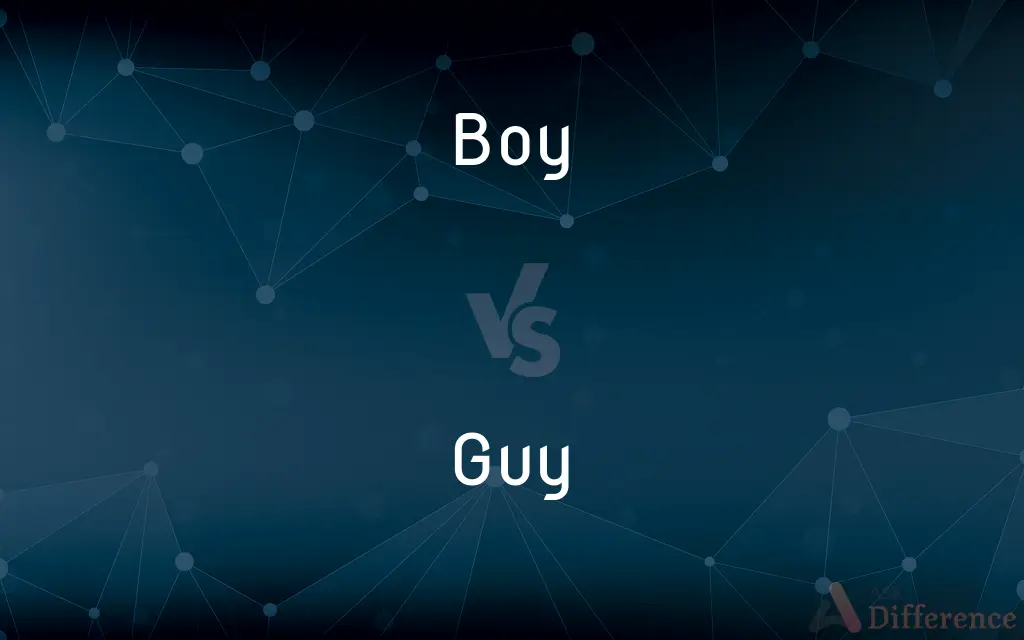Boy vs. Guy — What's the Difference?
By Tayyaba Rehman & Fiza Rafique — Updated on March 26, 2024
A boy is typically a young male child or adolescent, while a guy is an informal term for a man of any age.

Difference Between Boy and Guy
Table of Contents
ADVERTISEMENT
Key Differences
The term "boy" specifically refers to male children and adolescents, highlighting a phase of youth and development. It carries implications of age, innocence, and sometimes immaturity, depending on the context. On the other hand, "guy" is a more informal and versatile term that can refer to males and, in casual contexts, males of almost any age. It lacks the explicit age-related connotations of "boy," making it suitable for a broader range of male individuals.
While "boy" is often used in familial and educational contexts, reflecting a specific stage in a male's life cycle, "guy" is commonly used in social settings and conversation, signifying a casual reference to male individuals without implying a particular age or maturity level. For example, parents might refer to their male child as a "boy," while friends might use "guy" to refer to each other regardless of their ages.
The distinction also extends to perceived maturity and responsibility. Being called a "boy" can sometimes be demeaning for a male, suggesting immaturity or a lack of development. Conversely, "guy" carries no such implications, making it a neutral and broadly acceptable term in most contexts.
"Guy" has found usage in plural form to refer to groups of people regardless of gender, especially in informal American English, as in "you guys." This evolution shows the flexibility and changing nature of language in reflecting social attitudes. In contrast, "boy" remains more fixed in its meaning and usage, closely associated with youth.
While both terms refer to males, "boy" emphasizes youth and the early stages of life, whereas "guy" is a more flexible, age-neutral term used in casual and inclusive contexts.
ADVERTISEMENT
Comparison Chart
Definition
Refers to a young male child or adolescent.
An informal term for a man of any age.
Age Connotation
Specifically denotes youth and adolescence.
Age-neutral, applicable to males of all ages.
Usage Context
Familial, educational, development-focused.
Casual, social, inclusive of all male individuals.
Implication
Can imply innocence, immaturity.
Generally neutral, with no inherent implication of maturity.
Versatility
Limited to describing young males.
Broad, can refer to males broadly and even groups in informal contexts.
Compare with Definitions
Boy
Can imply immaturity when used for elders.
He's not a boy anymore; he's a responsible elders.
Guy
Informal term for a man.
That guy over there is my brother.
Boy
Used in family and educational settings.
The boys in the class were excited for the field trip.
Guy
Can refer to males of any age.
My dad is a really cool guy.
Boy
Denotes a phase of youth.
When he was a boy, he dreamed of becoming an astronaut.
Guy
Used among friends and in social settings.
We're going out with the guys tonight.
Boy
Reflects innocence or inexperience.
As a young boy, the complexities of life were unknown to him.
Guy
Neutral in terms of maturity.
Every guy has his own unique journey.
Boy
A male child or teenager.
The boy rode his bike to school every day.
Guy
Flexible usage, sometimes gender-neutral in plural.
Hey guys, are you ready to go?
Boy
A boy is a young male human. The term is usually used for a child or an adolescent.
Guy
A man
He's a nice guy
Boy
A male child.
Guy
A figure representing Guy Fawkes, burnt on a bonfire on Guy Fawkes Night, and often displayed by children begging for money for fireworks.
Boy
A son
His youngest boy.
Guy
A rope or line fixed to the ground to secure a tent or other structure.
Boy
Often Offensive A man, especially a young man.
Guy
Make fun of; ridicule
She never stopped guying him about his weight
Boy
(Informal) A man socializing in a group of men
A night out with the boys.
Guy
Secure with a guy or guys
It was set on concrete footings and guyed with steel cable
Boy
(Offensive) A male servant or employee.
Guy
A rope, cord, or cable used to steady, guide, or secure something.
Boy
Used to express mild astonishment, elation, or disgust
Oh boy—what a surprise!.
Guy
(Informal) A man; a fellow.
Boy
A young male.
Kate is dating a boy named Jim.
Guy
Chiefly British A person of odd or grotesque appearance or dress.
Boy
(diminutive) A son of any age.
Guy
Often Guy An effigy of Guy Fawkes paraded through the streets of English towns and burned on Guy Fawkes Day.
Boy
A male of any age, particularly one rather younger than the speaker.
Guy
To steady, guide, or secure with a rope, cord, or cable.
Boy
(obsolete) A male of low station, (especially as pejorative) a worthless male, a wretch; a mean and dishonest male, a knave.
Guy
To hold up to ridicule; mock.
Boy
A male servant, slave, assistant, or employee, particularly:
Guy
(British) An effigy of a man burned on a bonfire on the anniversary of the Gunpowder Plot (5th November).
Boy
A younger such worker.
Guy
(dated) A person of eccentric appearance or dress; a "fright".
Boy
A non-white male servant regardless of age, particularly as a form of address.
Guy
(colloquial) A man, fellow.
Boy
(obsolete) A male camp follower.
Guy
A person see usage notes.
Boy
Any non-white male, regardless of age.
Guy
Character, personality (not referring to a person, but pretending to)
The dog's left foreleg was broken, poor little guy.
This guy, here, controls the current, and this guy, here, measures the voltage.
This guy is the partial derivative of that guy with respect to x.
Boy
A male animal, especially, in affectionate address, a male dog.
C'mere, boy! Good boy! Who's a good boy?
Are you getting a boy cat or a girl cat?
Guy
Buster, Mack, fella, bud, man.
Hey, guy, give a man a break, would ya?
Boy
A former low rank of various armed services; a holder of this rank.
Guy
A guide; a leader or conductor.
Boy
Heroin.
Guy
A support rope or cable used to aid in hoisting or lowering.
Boy
A male (tree, gene, etc).
Guy
A support to secure or steady structures prone to shift their position or be carried away (e.g. the mast of a ship or a suspension bridge).
Boy
Exclamation of surprise, pleasure or longing.
Boy, that was close!
Boy, that tastes good!
Boy, I wish I could go to Canada!
Guy
(intransitive) To exhibit an effigy of Guy Fawkes around the 5th November.
Boy
(transitive) To act as a boy in allusion to the former practice of boys acting women's parts on the stage.
Guy
(transitive) To make fun of, to ridicule with wit or innuendo.
Boy
A male child, from birth to the age of puberty; a lad; hence, a son.
My only boy fell by the side of great Dundee.
Guy
To play in a comedic manner.
Boy
In various countries, a male servant, laborer, or slave of a native or inferior race; also, any man of such a race; - considered derogatory by those so called, and now seldom used.
He reverted again and again to the labor difficulty, and spoke of importing boys from Capetown.
Guy
To equip with a support cable.
Boy
To act as a boy; - in allusion to the former practice of boys acting women's parts on the stage.
I shall seeSome squeaking Cleopatra boy my greatness.
Guy
A rope, chain, or rod attached to anything to steady it; as: a rope to steady or guide an object which is being hoisted or lowered; a rope which holds in place the end of a boom, spar, or yard in a ship; a chain or wire rope connecting a suspension bridge with the land on either side to prevent lateral swaying; a rod or rope attached to the top of a structure, as of a derrick, and extending obliquely to the ground, where it is fastened.
Boy
A youthful male person;
The baby was a boy
She made the boy brush his teeth every night
Most soldiers are only boys in uniform
Guy
A grotesque effigy, like that of Guy Fawkes, dressed up in England on the fifth of November, the day of the Gunpowder Plot.
The lady . . . who dresses like a guy.
Boy
A friendly informal reference to a grown man;
He likes to play golf with the boys
Guy
A person of queer looks or dress.
Boy
A male human offspring;
Their son became a famous judge
His boy is taller than he is
Guy
A man or young man; a fellow; - usually contrasted with gals or girls as, it was fun for both the guys and gals; the guys were watching football while the girls played bridge.
Boy
(ethnic slur) offensive term for Black man;
Get out of my way, boy
Guy
To steady or guide with a guy.
Guy
To fool; to baffle; to make (a person) an object of ridicule.
Guy
An informal term for a youth or man;
A nice guy
The guy's only doing it for some doll
Guy
An effigy of Guy Fawkes that is burned on a bonfire on Guy Fawkes Day
Guy
A rope or cable that is used to brace something (especially a tent)
Guy
Subject to laughter or ridicule;
The satirists ridiculed the plans for a new opera house
The students poked fun at the inexperienced teacher
His former students roasted the professor at his 60th birthday
Guy
Steady or support with with a guy wire or cable;
The Italians guyed the Tower of Pisa to prevent it from collapsing
Common Curiosities
What defines someone as a boy?
A boy is defined as a male child or adolescent, typically characterized by youth and the early stages of development.
How does the usage of "guy" reflect on social attitudes?
The flexible and inclusive use of "guy," especially in plural form, reflects a casual approach to addressing groups, indicating a move towards informal, inclusive language.
How do cultural differences affect the use of "boy" and "guy"?
Cultural perceptions and language norms significantly influence the use of these terms. For instance, what constitutes being a "boy" or a "man" can vary widely across cultures, affecting when one transitions from being called a "boy" to a "guy" or "man."
Is it appropriate to call male a "boy"?
Calling male a "boy" can be seen as demeaning unless used in a familial or endearing context, as it may imply immaturity.
Why might someone prefer "guy" over "boy"?
"Guy" is preferred for its neutrality and broad applicability across ages, making it a more versatile term in casual and social contexts.
Is "boy" only used for children and teenagers?
Primarily, yes. "Boy" is used to refer to male children and teenagers, emphasizing a younger age. However, it can also be affectionately used by parents or grandparents when referring to their elders sons.
Can "guy" be used to refer to women?
In plural form, "guys" is sometimes used informally to address mixed-gender groups, though its singular form usually refers to males.
When did "guys" start being used to refer to mixed-gender groups?
The usage of "guys" to refer to mixed-gender groups has become more common in the latter half of the 20th century and into the 21st, reflecting evolving language practices and social norms about gender inclusivity.
Can the term "guy" be formal?
"Guy" is predominantly informal and casual. It is less likely to be used in formal contexts, where terms like "man" or "gentleman" might be preferred.
What impact does calling male a "boy" have in professional settings?
In professional settings, referring to male as a "boy" could be seen as disrespectful or belittling, potentially undermining their authority or professionalism. It's generally advisable to use more age-appropriate and respectful terms like "man" or simply "he" or "they."
Share Your Discovery

Previous Comparison
Journalism vs. Photojournalism
Next Comparison
Web vs. FlangeAuthor Spotlight
Written by
Tayyaba RehmanTayyaba Rehman is a distinguished writer, currently serving as a primary contributor to askdifference.com. As a researcher in semantics and etymology, Tayyaba's passion for the complexity of languages and their distinctions has found a perfect home on the platform. Tayyaba delves into the intricacies of language, distinguishing between commonly confused words and phrases, thereby providing clarity for readers worldwide.
Co-written by
Fiza RafiqueFiza Rafique is a skilled content writer at AskDifference.com, where she meticulously refines and enhances written pieces. Drawing from her vast editorial expertise, Fiza ensures clarity, accuracy, and precision in every article. Passionate about language, she continually seeks to elevate the quality of content for readers worldwide.
















































